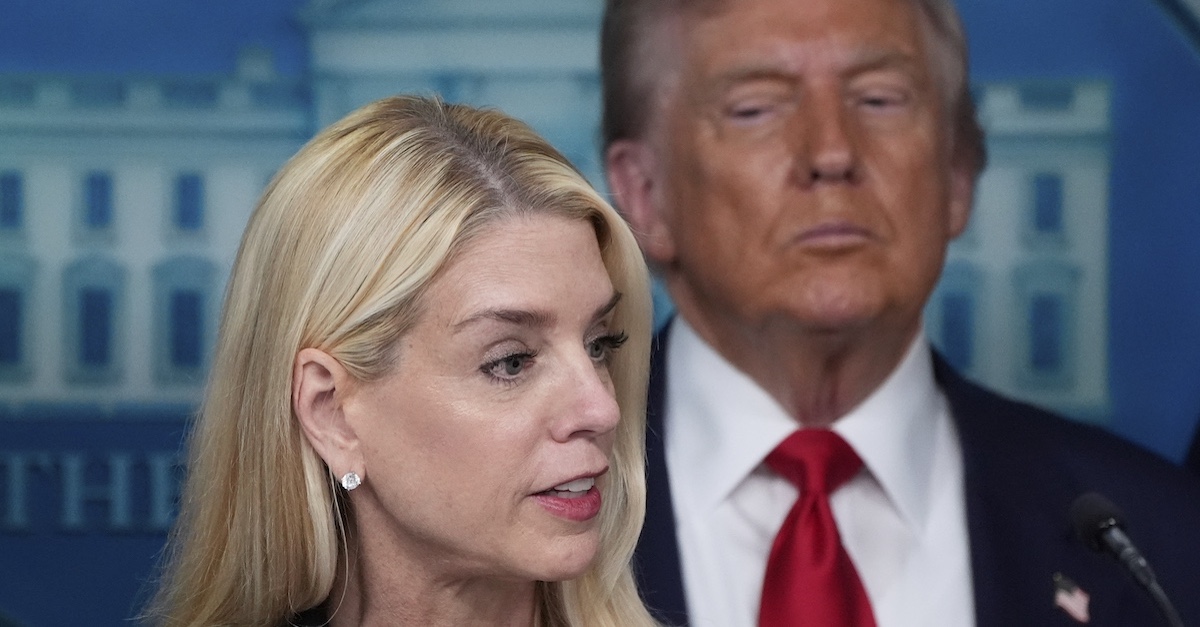
Attorney General Pam Bondi speaks with reporters in the James Brady Press Briefing Room at the White House, Monday, Aug. 11, 2025, in Washington, as President Donald Trump looks on (AP Photo/Alex Brandon).
A federal judge has tossed out a Trump administration lawsuit against New York state over immigration cooperation, ruling that enacting and enforcing a law protecting against courthouse arrests is the state's prerogative.
In a 41-page order issued on Monday, U.S. District Judge Mae D'Agostino ruled that New York cannot be deprived "of its essential ability to protect its sovereign interests in the face of undue federal interference."
Love true crime? Sign up for our newsletter, The Law&Crime Docket, to get the latest real-life crime stories delivered right to your inbox.
On June 12, the Trump administration sued New York Gov. Kathy Hochul and Attorney General Letitia James over provisions in the state's Protect Our Courts Act (POCA), a 2020 law designed to "facilitate continued access to the justice system and courts by all members of the community without fear of immigration-related consequences." Also subjects of the lawsuit were two Empire State executive orders — implemented in 2018 by then-Gov. Andrew Cuomo — that limited New York law enforcement's obligations to comply with federal immigration directives.
The orders and legislation were enacted during the first Trump administration, when civil immigration arrests at state courthouses increased by approximately 1,200% over the administration's first three years, D'Agostino recalls. Efforts to detain suspected illegal immigrants at state courthouses continued after Trump returned to office in January, leading to the federal-state conflict.
At the heart of the dispute was whether the federal government's laws preempted the state legislation and orders. The Justice Department argued that they indeed do, also alleging that New York's actions unlawfully discriminated against the federal government.
D'Agostino rubbished these claims.
"The Court agrees with Defendants that the United States' preemption challenges to these Executive Orders fail because neither executive order conflicts with federal law," the Barack Obama appointee wrote. She continued, at length:
"Fundamentally, the United States fails to identify any federal law mandating that state and local officials generally assist or cooperate with federal immigration enforcement efforts. Nor could it. No such federal laws exist because the Tenth Amendment prohibits Congress from conscripting state and local officials and resources to assist with federal regulatory schemes, like immigration enforcement. It may be, as the United States contends, that Congress had "the expectation of collaboration" between federal, state, and local authorities when it enacted the federal immigration laws. But a hope, however fervent, that federal-state cooperation will occur does not empower the federal government to conscript the States."
As part of its discrimination claims, the Trump administration argued that New York had violated the intergovernmental immunity doctrine, a legal principle meant to ensure that state laws could not regulate or discriminate against the federal government. In her conclusion, D'Agostino ruled that just because the Trump administration wants New York to cooperate does not mean its desires hold more weight than the state's.
"Where, as here, the Tenth Amendment permits a state to decline to assist with federal immigration efforts, that state's determination that its interests are best served by not permitting its resources to be conscripted for federal immigration enforcement cannot be invalidated merely by recasting that otherwise permissible choice under the intergovernmental immunity lens," she wrote. "To hold to the contrary would improperly elevate the concerns of the federal sovereign over that of a State and deprive New York of its essential ability to protect its sovereign interests in the face of undue federal interference."
James celebrated the court's decision on Tuesday, saying, "Everyone deserves to seek justice without fear."
"This ruling ensures that anyone can use New York's state courts without being targeted by federal authorities," she continued. "My office will continue fighting to defend the dignity and rights of immigrant communities throughout New York."
Comments